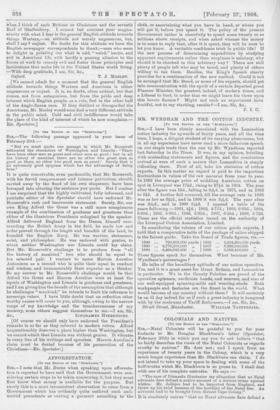MR. WYNDHAM AND THE COTTON INDUSTRY. [To Tau ItHIT011 OF
THE . sracreron....] SIR,—I have been closely associated with the Lancashire ootton industry for upwards of thirty years, and all the time been, I hope, a diligent student of its varying phenomena, but in all my experience have never read a more fallacious speech on our staple trade than the one by Mr. Wyndham reported last Saturday in the Times. It was, in my opinion, bristling with misleading statements and figures, and the conclusions arrived at were of such a nature that Lancashire is simply ridiculing them. First of all, take his statistics of cotton exports. In this matter no regard is paid to the important fluctuations in values of the raw material from year to year. In 1862 the average price of middling American cotton on spot in Liverpool was 17fd., rising to 27id. in 1864. The year after the figure was I9d., falling to 84d. in 1871, and in 1883 to 5fd. A. further fall occurred, till the average rate in 1895 was as low as 3H-d., and in 1898 it was 3150d. The year after was 3M., and in 1900 51fid. I append a table of the years following :-1901, qd.; 1902, 4.77d.; 1903, 6.03d.; 1904, 6.60d.; 1905, 509i1.; 1906, 595d.; 1907, 655d.; 1908, 5.72d. These are the official statistics issued on the authority of the Liverpool Cotton Association, Limited.
In considering the volume of our cotton goods exports, I hold that a comparative table of the yardage of calico shipped is the fairest guide. Take the Board of Trade figures, viz, :—
1844) ...
1860 ...
1880 ... 700,632,000 yards 2,770,218,000 „ 4,494,645,000 „ 1900 ...
1907 ... 1 1908 ... 5,034,250,000 yards 6,298,040,000 „ 6,532,413,000 „
These figures speak for themselves. What becomes of Mr. Wyndham's percentages ?
He talks of the hereditary aptitude of our cotton operative. Yes, and it is a great asset for Great Britain, and Lancashire in particular. We in the County Palatine are proud of the operative spinners, cardroom hands, and weavers, and also of our well-equipped spinning-mills and weaving-sheds. Both workpeople and factories are the finest in the world. What would become of our country without them ? It will certainly be an ill day indeed for us if such a great industry is tampered with by the nostrums of Tariff Reformers.—I am, Sir, ac.,






































 Previous page
Previous page